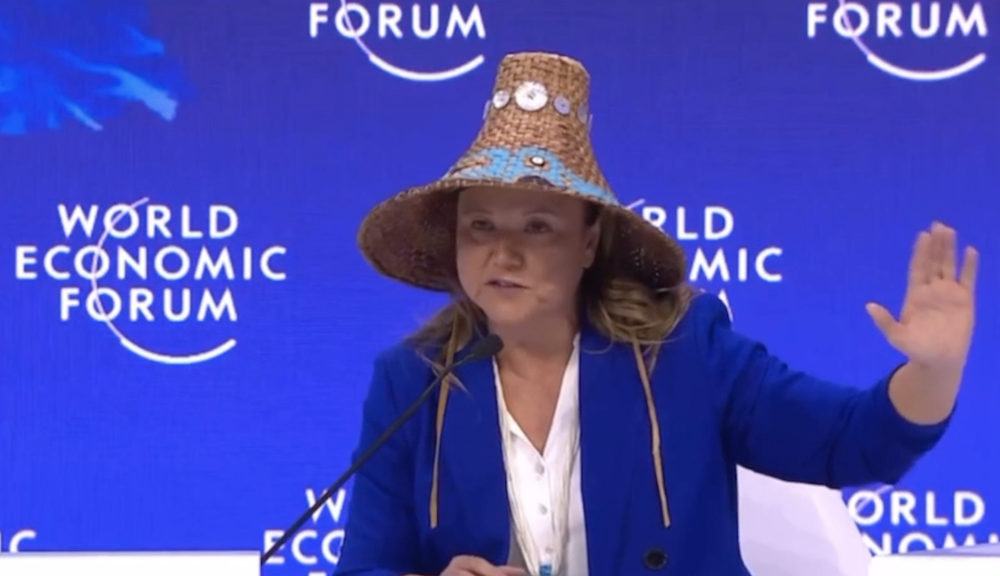
- Details
- By Levi Rickert
National Congress of American Indians (NCAI) President Fawn Sharp (Quinault Nation) took to the world stage on Wednesday in Davos, Switzerland to bring the Indigenous perspective as a panelist on climate change.
Sitting next to former Vice President Al Gore, Sharp was part of the “Leading the Charge Through Earth’s New Normal” panel discussion that provided an overview of how climate change impacts economies around the world.
Introducing Sharp, the panel’s moderator, Gim Huay Neo, said the world’s Indigenous peoples represent five percent of humanity while they protect 80 percent of Earth's biodiversity.
“One-third of all US territories are owned or governed by Indigenous communities, and 91 percent of this land is actually in good or fair ecological condition. So they are contributing disproportionately to the health of our ecosystem,” Neo said.
During her remarks, Sharp invoked Chief Seattle, who is famous for his 1854 speech on environmental issues.
“Chief Seattle taught us that all things are connected. What we do to the earth, we do to ourselves. We are but one strand in a very complex web of life,” Sharp said.
In addition to her duties as NCAI’s president and political leadership of the Quinault Nation in Washington state, Sharp has done extensive work in the realm of environmental protections.
In 2018, Sharp co-authored and co-led the state of Washington’s Initiative-1631, the most aggressive climate change initiative in American history.
“It's important to understand from our perspective, we've been taught through the ages that every life form on the face of the planet has its proper place as divinely ordained by our Almighty Creator,” Sharp said.
Sharp emphasized the importance of Indigenous knowledge that was given in the past generations and then passed down through generations about how to take care of the environment.
“I want to make it very clear here today. Indigenous peoples are not weak and vulnerable. We are strong, we are resilient. We have in our DNA ancestral knowledge that goes back from that very first generation that was called to planet earth. We were taught these things. And through the ages, generation after generation, we have taken that knowledge and we passed it on to future generations looking seven generations out,” Sharp said.
Besides Sharp and Gore, the panel included: Andrew Forrest , chairman and founder, Fortescue Metals Group, from Australia; President Gustavo Francisco Petro Urrego, Colombia; Roshni Nadar Malhotra, chairperson, HCLTech, from India; Community of Chairpersons; Marc Benioff , chair and co-chief executive officer of software company Salesforce and a member of board of trustees of the World Economic Forum, from the United States.
Neo asked each panelist for one word to leave behind. Sharp’s word was “Indigenous.”
More Stories Like This
Southern Sierra Miwuk Nation Gets 900-Acres ofLand BackChilkat Indian Village Tells New Palmer Mine Owners They Are “Not Welcome” in Chilkat Valley
Tribes, Coastal Group Ask Army Corps to Revoke Permit for Texas Export Terminal
Michigan Tribes Tell Supreme Court: Don’t Bail Out Enbridge
Alaskans Raise More Than $1 Million For Communities Devastated by Typhoon Halong
Help us tell the stories that could save Native languages and food traditions
At a critical moment for Indian Country, Native News Online is embarking on our most ambitious reporting project yet: "Cultivating Culture," a three-year investigation into two forces shaping Native community survival—food sovereignty and language revitalization.
The devastating impact of COVID-19 accelerated the loss of Native elders and with them, irreplaceable cultural knowledge. Yet across tribal communities, innovative leaders are fighting back, reclaiming traditional food systems and breathing new life into Native languages. These aren't just cultural preservation efforts—they're powerful pathways to community health, healing, and resilience.
Our dedicated reporting team will spend three years documenting these stories through on-the-ground reporting in 18 tribal communities, producing over 200 in-depth stories, 18 podcast episodes, and multimedia content that amplifies Indigenous voices. We'll show policymakers, funders, and allies how cultural restoration directly impacts physical and mental wellness while celebrating successful models of sovereignty and self-determination.
This isn't corporate media parachuting into Indian Country for a quick story. This is sustained, relationship-based journalism by Native reporters who understand these communities. It's "Warrior Journalism"—fearless reporting that serves the 5.5 million readers who depend on us for news that mainstream media often ignores.
We need your help right now. While we've secured partial funding, we're still $450,000 short of our three-year budget. Our immediate goal is $25,000 this month to keep this critical work moving forward—funding reporter salaries, travel to remote communities, photography, and the deep reporting these stories deserve.
Every dollar directly supports Indigenous journalists telling Indigenous stories. Whether it's $5 or $50, your contribution ensures these vital narratives of resilience, innovation, and hope don't disappear into silence.
 The stakes couldn't be higher. Native languages are being lost at an alarming rate. Food insecurity plagues many tribal communities. But solutions are emerging, and these stories need to be told.
The stakes couldn't be higher. Native languages are being lost at an alarming rate. Food insecurity plagues many tribal communities. But solutions are emerging, and these stories need to be told.
Support independent Native journalism. Fund the stories that matter.
Levi Rickert (Potawatomi), Editor & Publisher

